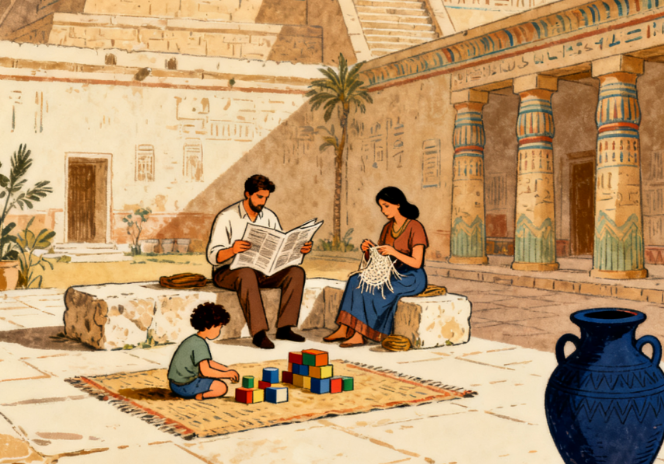《原来如此 》-这些国家都已经做四休三了 ?那我多上的一天班算什么 ...



酒 馆 | 福 利



图片均来源于网络 | 侵删
加小助手VX【luluxjg2】领取全文逐字稿

Why is the workweek five days?

The idea of a seven-day week comes from ancient Babylonian and Jewish traditions, which included a day of rest (the Sabbath).
▼
In many cultures, one day of the week (usually Saturday or Sunday) was seen as sacred or a rest day.
▼
In the early 20th century, most people worked six days a week, with only Sunday off for religious reasons.
▼
The five-day workweek started to grow in popularity in the United States in the 1920s, especially in factories.
▼
One reason was to respect both Christian and Jewish traditions—giving Sunday and Saturday off.
▼
The Ford Motor Company was one of the first major businesses to introduce a 40-hour, five-day workweek in 1926 to improve worker productivity and morale.
▼
Governments and other companies followed this model, and it became the standard in many parts of the world.
▼
The idea was that workers would be more efficient if they had time to rest and spend with family.
▼
Today, the five-day workweek is common, though some countries and companies are now experimenting with four-day weeks.



Useful Phrases
Expressions
“A typical 9-to-5 job”
– A standard full-time job with set hours.
“The weekend”
– Saturday and Sunday, when most people don’t work.
“Work-life balance”
– The balance between your job and personal life.
“A day off”
– A day when you don’t have to work.
“Office hours”
– The usual hours when work is done.
“Full-time job”
– A job with regular hours, usually five days a week.
“Rest and recharge”
– To recover energy during time off.


Hi, everyone and welcome back to one of your favorite segments【Oh, So That's Why!】《原来如此》. Hi, 安澜.
hi, Lulu, hi everyone.
So in this episode, 安澜and I will explore some of the common behaviors or customs in western culture or in cultures in general and get to the bottom of their origins. So what are we going to talk about today?
Today we're gonna be talking about something that we all know about. We all probably think about every single day, but don't know the reason why.
Okay.
Why is the work week 5 days?
Actually, I think in some European countries, they're changing to 4days.
They're experimenting with it, but it's still universal, more or less, five working days, 2 days for the weekend.
It's supposed to be like that. I know for a fact that many companies in China are not like... in reality is not like that.
Yes.
So, five workdays, hang on, isn't that from religion? It's not from business, is it?
Partly religion, partly business.
Okay.
So, First of all, let's look at historical background. So the idea of the 7-day-week comes from ancient Babylonian and Jewish traditions.
对, 一周七天, I think many people don't really realize that or they don't even think about it. I think most people just take it for granted, there are 7 days of the week. But who decided that? Ancient Babylonian就是古巴比伦人, 还有犹太人.
So, in ancient Rome, for example, the week was normally 10 days.
I believe we also had different ways of calculating sort of like the cycles.
And in many ancients cultures, there wasn't really like a fixed day off. It was more about festivals. So for example, in ancient Rome, people didn't have a regular weekend, but what they did have were loads and loads and loads of festivals.
Festivals probably like religious rites so that they could take that day off.
Yes, precisely.
You know in Chinese, ancient Chinese culture there was something called like a Bath Day, 它叫休沐, 就是沐浴的沐.
So that was the day that people like officials took rest.
Precisely. So, in many cultures though, there was usually one day of the week, usually a Saturday or Sunday which was seen as a sacred or rest day, particularly in Jewish, Christian and Muslim religions.
Didn't they call it “The sabbath”叫安息日. It's not really about workers, you can rest, you've been working hard; it's more like that is the day forbidden by their god that people should just do religious things worship instead of doing other things.
So, up until the early 20th century, most people work 6 days a week,
Oh they took one day to worship.
Yeah, with only Sunday off for religious reasons, but it was in the 1920s in America that companies such as Ford started to introduce the idea of a 40-hour, 5-day workweek.
40...So that would be like 8 hours a day, like 9 to 5.
Nine to five 就是朝九晚五,从那个时候开始。
And the main reason for this was to improve worker productivity and morale.
Now the reason why they chose Sunday and Saturday was because they wanted to respect both Christian and Jewish traditions. So Sunday being the Sabbath for Christians, Saturday being the Sabbath for Jewish people for Jewish employees.
I hope more religions mixed together so that you can take even more days off for different religious purposes. I’m just joking obviously.
You think about the Saturday Sunday model that's not the same in Arab countries. It's Friday, Saturday.
Either way it doesn't really matter. Does it? It’s just 2 days off.
It’s 2 days off. But it comes from mostly religious reasons.
And obviously, even countries that are not religious, they adopt the same pattern because as the world sort of links together, there's not much point people working on one day and other people working... not working on another day. This has become the universal standard.
I think the idea was, the original idea, obviously was you go to the church or you do religious things, but then it gradually just became that workers would just use that time to rest and spend with family or doing whatever they want to do.
Well, yeah.
I remember when I was a kid that was when they started having Sunday trading in the UK because for many many years shops were closed on Sunday.
What did people use to do then? On Sunday.
They would go to church, they would spend time with their family, they would have a Sunday roast.
Yes, in British culture or in English culture there’s the idea of a Sunday roast. It's kind of like a family get together on Sundays, roast beef or roast lamb.
Because people had the time to make that food. And also Sunday was seen as a day of rest and meat was expensive, so people would save up for the Sunday.
And also there wasn't anything else to do really, it's not really like you could go to amusement park or go watch a movie or go to the pub or go to the shop. Oh, pubs are open? Pubs are always open. Why don't they get a day off then?
Well, the whole thing is that even nowadays the time that shops open on the Sunday is shorter in England.
I think not just in England, across Europe, there's that thing, some shops just open half a day , would close at two or three on Sunday.
And this all comes down to the idea of the basic work week being 5days. And as you mentioned, at the beginning of this episode, there are some countries and companies that are experimenting with 4-day weeks.
How do you feel about that?
I think it's a good idea. I'm not just saying that because I want a day off because let's face it, I don't really get days off, well, haven’t you.
So, whether or not I work 4 days or 5days, it's really immaterial to me personally. But, I can understand that if people work in 4 days, they have to condense their work into a shorter period of time, so they have to be more productive. They have more time with their family, and also they will have more time to spend money as well.
You don't think that is a bit of a wishful thinking that people who cannot really generate enough results within a 5-day work week will generate better results If they have a 4-day work week.
Well it's what they call Parkinson's law, isn't it?
I think I've heard of that. Yeah, but I'm not sure, we'll have to wait and see, but then again, people would think Lulu, you speak like a boss.
But for those of you don't hope Parkinson's law is the idea that it's from time management. If you give a certain amount of time for a task, you will fill up that time no matter what. So the idea that if you want to write an email within an hour or 10minutes, it will take you an hour or 10 minutes because you've already set the time aside for that.
That I kind of agree, because if I give myself 2 hours that email is going to take 2hours.
Okay, as we're approaching to the end of this episode, let's do some related expressions.
For example, we were talking about a 9 to 5 job, 一个朝九晚五的工作. We say she's working a typical 9 to 5 job.
Or it's just a 9 to 5. That just means it's a normal job, full time job, set hours.
Yeah. As opposed to what we do which is flexible hours although we work a lot more.
The idea of the weekend, Saturday and Sunday,
The weekdays and the weekend.
And it's not really an expression that I dare say you have to really learn, because I dare say you already know it, work life balance.
This is so often mentioned nowadays, work life balance, although we don't really have a...
work life balance.
No, I mean we have a direct translation in Chinese工作生活平衡, that much of a thing like it's not like a set phrase, there's not a set phrase for it in Chinese as in English because in English people have been talking about WLB, work life balance, for ages. For me, I absolutely have no work life balance, I just have work.
No I know. So to finish off it's important to know what the weekend really is for, to rest and recharge.
As we're recording this episode on weekend, I thought you were going to say, remember weekend is for extra work.
This is a Sunday that we're recording this on.
Yeah, to rest and recharge. 中文也叫充电, 你这个人一周已经特别耗能给耗干了, and then you can rest and recharge to achieve the ultimate work life balance.
So leave us a comment in the comments section and put in your request for any further customs, behaviors or cultural phenomenon that you want us to talk about in this segment.
So until next time.
We'll see you next time.
Bye bye.
排版长图:
文稿校对:
图片来源:
Jer.ry
李燕 & Jenny
均来源于网络 | 侵删
▻▻▻
最后,因为微信公众号推送机制的变革,
现在没有星标的账号,很容易就错过推送,
所以如果你喜欢小酒馆的推文,
拜托一定一定别忘记
⭐星标⭐【璐璐的英文小酒馆】哦,
星标不迷路!
点开公众号名片,点击右上角“…”
再点击“设为星标”即可,在酒馆等你哦~ 👇
酒馆铺子
全球小众精品好物聚集地:
(点击以上图片,Get世界精选好物)

酒馆需要你的 点赞,在看,收藏!
动动手指为我们的小酒馆助力吧~
















